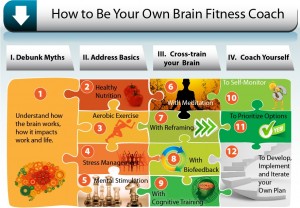New Self-Paced Brain Fitness Course Answers 40 Common Questions about Brain Health and Brain Training
 We are pleased to offer the first self-paced course designed to equip lifelong learners with the understanding and information required to apply neuroplasticity and cognitive reserve findings and tools to enhance their own brain health and functionality.
We are pleased to offer the first self-paced course designed to equip lifelong learners with the understanding and information required to apply neuroplasticity and cognitive reserve findings and tools to enhance their own brain health and functionality.
Detailed information is available at How to Be Your Own Brain Fitness Coach. Registered participants can immediately log into the course and gain access to four recorded lectures–each lasting two hours– and to online materials and discussions. Registration fees are $95, and students have six months to complete course.
TOP 40 QUESTIONS ON BRAIN HEALTH, BRAIN FITNESS AND BRAIN TRAINING TO BE ADDRESSED BY THE COURSE:
- How can one define brain fitness
- What is link between stress, focus and memory
- Does “brain age” even exist
- How to enhance overall mental productivity, vs just IQ
- Is there some “ceiling” to my improvement or can I always try more things
- How brain functions evolve with age. What improves, what declines, what should I be paying attention to
- Can lifelong learning delay dementia
- What are specific guidelines to lead a lifestyle that maximizes brain fitness
- How to increase my chances to avoid Alzheimer’s Disease
- How do I know what is part of the normal aging process and what isn’t
- What are the main pillars to enhance cognition, and how do they work
- What are the “active ingredients” for experiences to build new neural pathways
- Are dietary supplements beneficial? How does nutrition and exercise improve cognitive skills?
- What is the state of the science of cognitive health and fitness? What types of claims make sense?
- Can videogames protect from dementia
- Does stress kill neurons?
- Can we increase the capacity/ plasticity of the brain?
- What are the best preventive steps that can be taken today to maintain brain health over many years?
- What are the types of activities shown to build cognitive reserve
- How can brain training principles can be APPLIED to everyday work and life and learning, not just while doing programs
- Can I improve memory and focus capabilities
- What’s the best evidence for what helps in brain training
- How can I train my brain to focus/concentrate more when I need to focus/concentrate and shut down when I need to or want to sleep
- How to effectively use brain teasers and brain games to improve brain function
- How do I choose between product A or B?
- How brain training works and the benefits we can expect to receive from it
- How can I evaluate whether the claims are evidence-based
- Is meditation better than yoga for the brain?
- How does brain training generalize to every day life? Is there research to support claims?
- How I can prevent age-related cognitive deterioration/ loss/ dementia
- How to enhance mental flexibility?
 How do I measure progress and results? How can I track that what I try really works?
How do I measure progress and results? How can I track that what I try really works?- How I go about being my own Brain Fitness Coach
- How do I get started?
- How to evaluate whether real change has occurred?
 How to set up a consistent practise with say 20 minutes everyday
How to set up a consistent practise with say 20 minutes everyday- Will any of this help me at work? How?
- How can the average person develop and self-manage a structured coaching plan in all phases of life that is valid and a good time investment
- What are the three or four things one can do on a daily basis to improve health and prevent impairment with age?
- What can I do in my everyday experiences to keep my brain in great condition, as I have/had several cases of dementia and Alzheimer’s in my family?
- How do I know what’s my baseline and how do I track/maintain positive progress over time?
Detailed information is available at How to Be Your Own Brain Fitness Coach.


